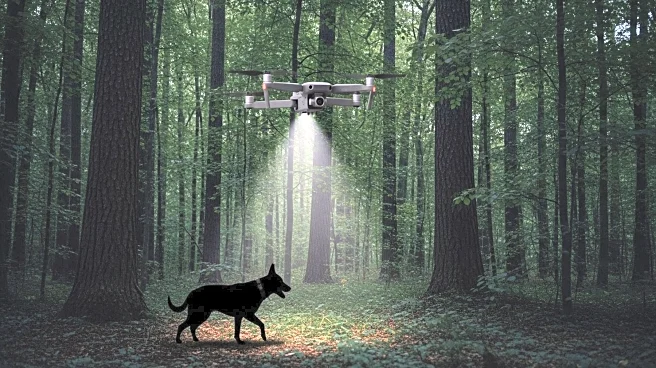What is the story about?
What's Happening?
The UK government is employing innovative methods to combat the spruce bark beetle, a significant threat to the country's forests. This beetle, known for devastating spruce trees across Europe, has been carried to the UK by winds over the English Channel. In response, government scientists are using drones, sniffer dogs, and advanced technology to detect and eradicate the beetle from at-risk areas in the east and southeast of England. The beetle's presence poses a substantial risk to the UK's timber industry, particularly affecting Sitka spruce, which is a major source of timber. The government has successfully eradicated the beetle from controlled areas, but climate change continues to pose challenges, potentially increasing the beetle's population and spread.
Why It's Important?
The spruce bark beetle represents a significant threat to the UK's forestry and timber industry, valued at approximately £2.9 billion annually. The beetle's ability to decimate spruce forests could lead to substantial economic losses and impact biodiversity. The government's proactive measures are crucial in preventing widespread destruction and maintaining the health of the country's forests. The use of drones and sniffer dogs highlights the innovative approaches being taken to address environmental challenges. However, the ongoing threat of climate change could exacerbate the situation, making it imperative for continued vigilance and adaptation of strategies to protect the forests.
What's Next?
The UK government plans to maintain its efforts in monitoring and controlling the beetle population, using advanced modeling techniques to predict potential incursions. Collaboration with institutions like the University of Cambridge and the Met Office is ongoing to refine these models. Additionally, there is a call for increased funding to support the preservation and restoration of ancient woodlands, which are at risk due to the beetle's presence. The government is encouraged to provide grants to landowners for recovery efforts, ensuring the long-term health and sustainability of the country's forests.
Beyond the Headlines
The battle against the spruce bark beetle raises broader questions about the impact of global trade and climate change on local ecosystems. The beetle's spread is partly attributed to international trade, which can introduce pests and diseases to new regions. Furthermore, climate change is altering weather patterns, stressing trees and making them more susceptible to infestations. This situation underscores the need for comprehensive environmental policies that address both immediate threats and long-term ecological shifts.
















